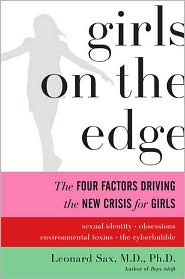
Like an impulse buy, except with a lower interest rate.
It was filed under "New NonFiction" right next to The Bellyfat Cure.
I'm not far enough in to give My Two Cents on it yet, but there is a study cited that I thought was interesting.
It was run by social psychologist Barbara Fredrickson and explored self-objectification.
The author of the Girls on the Edge, Dr. Leonard Sax, describes it as such:
Dr. Fredrickson and her colleagues recruited college men and women, then randomly assigned each volunteer to wear either a bulky sweater or swimsuit. The men wore swim trunks, and the women wore one-piece bathing suits. Each volunteer was sitting in a dressing room: no windows, no observers. Each volunteer was then asked to take a math quiz while sitting in the dressing room. Fredrickson and her team then compared how women wearing swimsuits performed on the quiz compared with women who were wearing bulky sweaters, and likewise for the men.The results?
Men can rock math tests in swim wear, and even do slightly better than men wearing frumpy sweaters.
Women can rock math tests in frumpy sweaters, but do waaaaaaay worse while wearing a swimsuit.
Sax goes on
[Fredrickson] found that these women were objectifying themselves. Just wearing a swimsuit made these young women focus on their own bodies as objects to be evaluated and rated.So the word is, if your daughter is off to school in a midriff shirt and JUICY pants, "at some level she's going to be thinking about, analyzing, and judging her own body when she ought to be thinking about geometry or Spanish grammar." Or when she ought to be thinking about how her mama gonna whoop her when I find out she took my JUICY pants! Give me those.
Now, where did I put that oversized reindeer sweater Miss C got for Christmas? I think I'm going to order a few more, sizes 4 Toddler through 18 I Hate My Mom.

This comment has been removed by the author.
ReplyDeleteBad Science, Mary!
ReplyDeleteIsn't this just a study showing that people do worse on math tests when they're anxious and that wearing swimsuits makes women more anxious than men? Why do we need to jump straight to higher-order constructs like "objectification" when we have good old fashioned simple ones like anxiety?
Alternatively, we could be looking at an effect caused by stereotype threat--I'm sure Mary knows what this is, but for those who don't, I'm talking about the effect wherein women who are reminded that they're women (and thus reminded of the stereotype that women are bad at math) actually do more poorly on math tests than they would if they weren't reminded of their gender. What better way to remind women that they're women than to make them get naked and put on revealing clothes?
But, um, awesome blog otherwise!
^...the men did better on the tests when they were wearing the swim suit than when they were wearing the sweater.
ReplyDeleteWhy would a woman have more anxiety in a bathing suit than in a sweater if it had nothing to do with her body? If she were simply nervous about the test then the results would be the same in the sweater or the bathing suit.
Oh, and last time I checked, I was pretty sure of my gender regardless of my outfit - sweater or bathing suit - yep, still a chick - but in a bathing suit I feel self-conscious, weird, and a little bit judged. Perhaps other women forget they're actually women when wearing sweaters and then forget they're supposed to be bad at math?
Anonymous #1: Valid points. I too was considering how I'd fare on a test in a swimsuit vs. sweater (I'd be cold!) but Fredrickson has tested this theory in a variety of circumstances and found consistent results.
ReplyDelete(Another example: throwing like a girl---http://jss.sagepub.com/content/29/1/79.short)
Her more recent work has focused on positive psychology, which is another interesting area if you are into that.
Anonymous #2: "but in a bathing suit I feel self-conscious, weird, and a little bit judged." Well put. I think this is more the norm, why else such stress about the approach of *swimsuit season!*
Objectification theory states "that Western culture socializes girls and women to self-objectify by adopting a third-person perspective on their bodies." And that this can impede performance.